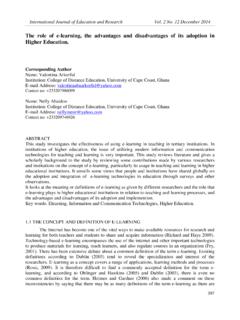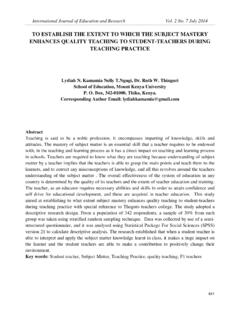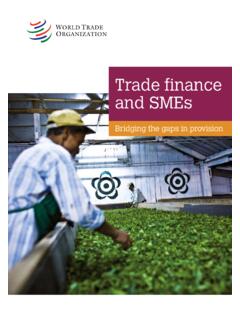Transcription of EFFECT OF PUBLIC FINANCIAL MANAGEMENT PRACTICES …
1 International Journal of Education and Research Vol. 5 No. 12 December 2017. EFFECT OF PUBLIC FINANCIAL MANAGEMENT PRACTICES ON. PERFORMANCE IN KERICHO COUNTY GOVERNMENT, KENYA: A CRITICAL REVIEW. Mr. Patrick Mutai Cheruiyota School of Entrepreneurship, Procurement and MANAGEMENT , Jomo Kenyatta University of Agriculture and Technology, Box 62000-00200, Nairobi, Kenya Phone +254-704688511. Mr. Julius Robert Oketchb School of Entrepreneurship, Procurement and MANAGEMENT , Jomo Kenyatta University of Agriculture and Technology, Box 62000-00200, Nairobi, Kenya Phone +254-713711140.
2 Professor Gregory S. Namusongec Full Professor School of Entrepreneurship, Procurement and MANAGEMENT , Jomo Kenyatta University of Agriculture and Technology, Box 62000-00200, Nairobi, Kenya Phone: +254-722-896092. Professor Maurice Sakwad Associate Professor School of Communication and Development Studies, Jomo Kenyatta University of Agriculture and Technology, Box 62000-00200, Nairobi, Kenya Phone: +254-721-590965. a Corresponding author's email: 211. ISSN: 2411-5681 ABSTRACT. This paper examines the scope to which PUBLIC FINANCIAL MANAGEMENT PRACTICES influences FINANCIAL performance in Kenya.
3 The Constitution of Kenya, 2010 and the PUBLIC finance MANAGEMENT (PFM) Act, 2012 have anchored PUBLIC finance on the principles of accountability and clear fiscal reporting. Chapter twelve on PFM Act addresses the financing of the functions of the two levels of Government towards an equitable society based on openness, accountability and PUBLIC participation in FINANCIAL matters. The National and County governments have the responsibility of ensuring accountability in resource use. The involvement of the Auditor General, the Controller of the Budget, and the National Treasury result in a continuous process of monitoring of resource use for optimal performance.
4 The central aim behind PUBLIC FINANCIAL performance is systematic and continuous evaluation of two levels of government so as to improve future performance on one hand and promote institutional learning and consequently, improve the quality of organizational decision making. Therefore, this article develops a conceptual framework that analyses the relationship between FINANCIAL MANAGEMENT PRACTICES and FINANCIAL performance in Kenya with particular emphasis to county government. Key words: PUBLIC finance MANAGEMENT PRACTICES , FINANCIAL Performance. 1 Introduction PUBLIC FINANCIAL MANAGEMENT is absolutely critical to improving the quality of PUBLIC service outcomes.
5 It affects how funding is used to address national and local priorities, the availability of resources for investment and the cost-effectiveness of PUBLIC services. Also, it is more than likely that the general PUBLIC will have greater trust in PUBLIC sector organizations if there is strong FINANCIAL stewardship, accountability and transparency in the use of PUBLIC funds (ACCA, 2010). It is important for governments to get it right because it impacts on a broad range of areas including: aggregate FINANCIAL MANAGEMENT (fiscal sustainability, resource mobilization and allocation), operational MANAGEMENT (performance, value-for money and budget MANAGEMENT ), governance (transparency and accountability) and fiduciary risk MANAGEMENT (controls, compliance and oversight) (Parry, 2010).
6 In addition, effective PUBLIC FINANCIAL MANAGEMENT is important for decision making. Accurate FINANCIAL information is often used as the mechanism to support decisions and ensure effective resource allocations. PUBLIC FINANCIAL MANAGEMENT is a complex field with many new initiatives and relatively few successes to date. Implementing PUBLIC FINANCIAL MANAGEMENT reform is a challenge in all countries, but to successfully mount and execute PUBLIC FINANCIAL MANAGEMENT projects in resource constrained countries; PUBLIC FINANCIAL MANAGEMENT PRACTICES adopted should be the ones that are both effective and efficient.
7 FINANCIAL Performance FINANCIAL performance refers to the degree to which FINANCIAL objectives are being or have been accomplished. It is the process of measuring the results of a firm's policies and operations in monetary terms. It is used to measure firm's overall FINANCIAL health over a given period of time and can also be used to compare similar firms across the same industry or to compare industries or sectors in aggregation. PUBLIC institutions in Kenya have traditionally been witnessed poor FINANCIAL performance due to poor FINANCIAL MANAGEMENT PRACTICES characterized by: Poor controls and audit trails and systems documentation; Lack of system data checks and controls; Poor response time.
8 Limited ability to generate reports and weak access security. Traditionally, FINANCIAL MANAGEMENT PRACTICES in government institutions are aimed at avoiding wastage and extravagant spending, and especially, the loss of resources through possible fraud, irregularity or improper spending. But the rise of New PUBLIC finance MANAGEMENT , associated with neo-liberalism, has significantly reduced the emphasis given to PUBLIC FINANCIAL MANAGEMENT regularity and probity. 212. International Journal of Education and Research Vol. 5 No. 12 December 2017. PUBLIC FINANCIAL MANAGEMENT PRACTICES Buger and Woods, (2008) defines PUBLIC FINANCIAL MANAGEMENT as an area that focuses on the prioritization and use of scarce resources, on ensuring effective utilization of PUBLIC resources, and on attaining value for money in meeting the objectives of Government and in particular delivering services to the people.
9 Correia et al, (2003) hold the view that, FINANCIAL MANAGEMENT forms part of the total operation of an organization and as such, it relates to the other functional disciplines in the organization. Fung, (2012) defines FINANCIAL MANAGEMENT as being part of the decision-making, planning and control subsystems of an enterprise. It is considered to incorporate: the treasury function, which includes the MANAGEMENT of working capital and the implications arising from exchange rate mechanisms due to international competition. It also incorporates the evaluation, selection, MANAGEMENT and control of new capital investment opportunities.
10 PUBLIC FINANCIAL MANAGEMENT PRACTICES are a collection of sufficient resources from the economy in an appropriate manner along with allocating and use of these resources efficiently and effectively. The PRACTICES include resource generation, resource allocation, and expenditure and resource utilization. There are several components of FINANCIAL MANAGEMENT and include FINANCIAL planning and control, FINANCIAL analysis, accounting information, MANAGEMENT accounting (pricing and costing), capital budgeting and working capital MANAGEMENT among others (Fung, 2012). Ahmed, et al, (2010), notes that FINANCIAL MANAGEMENT PRACTICES involve planning for the future of a business enterprise to ensure a positive cash flow.















